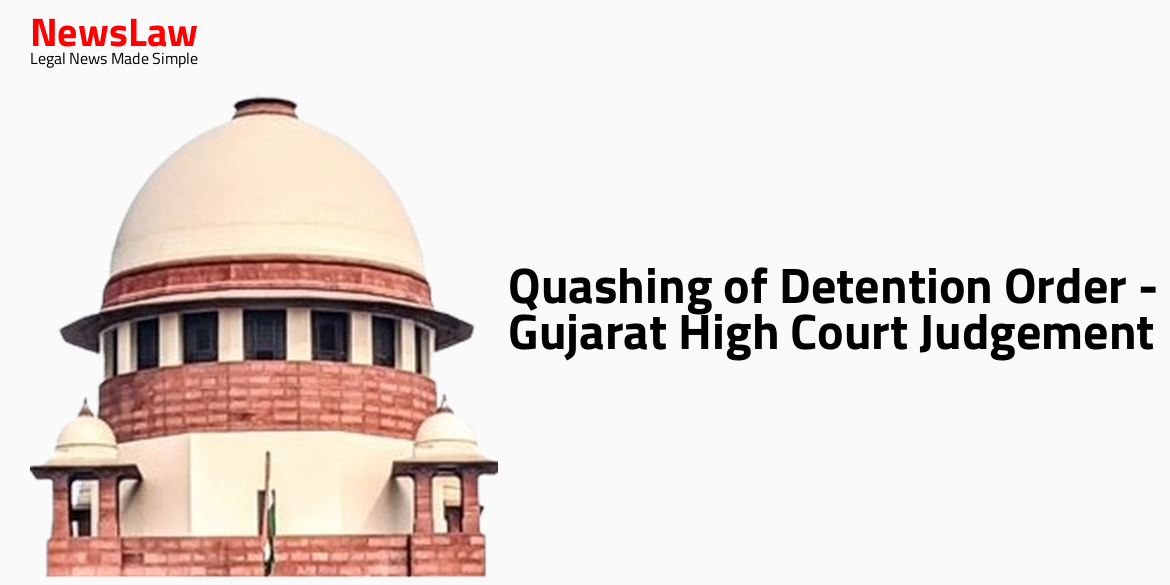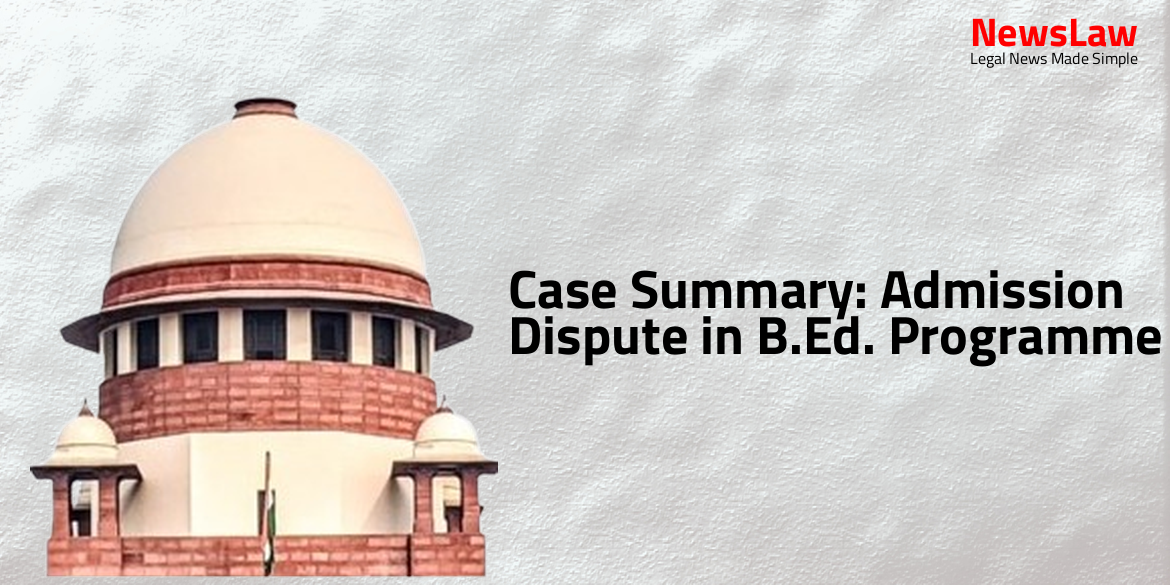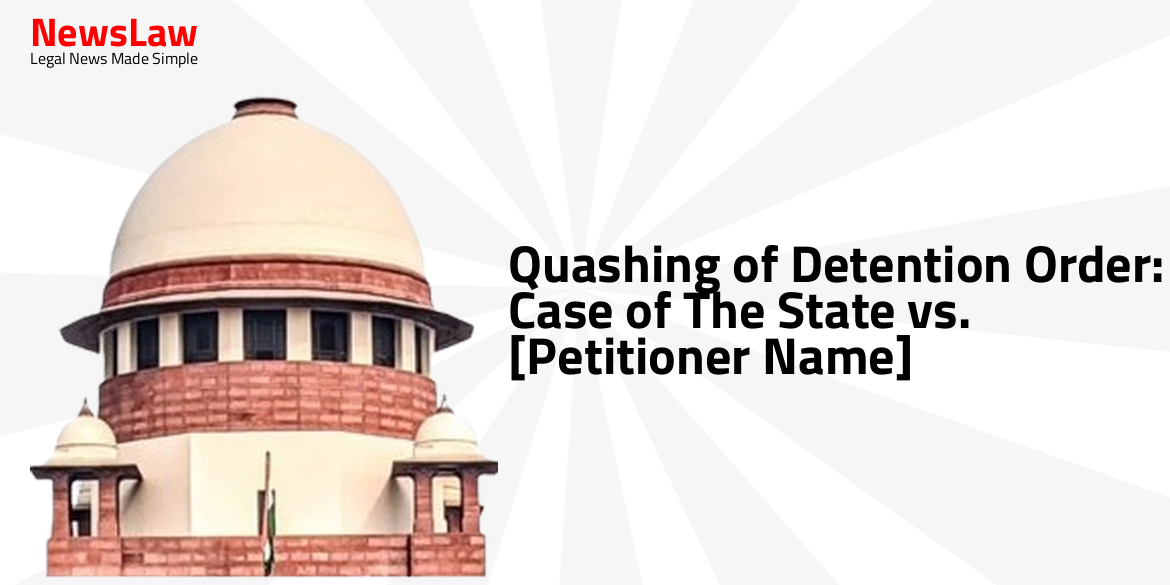A recent judgement by the Gujarat High Court has brought attention to the quashing of a detention order. The case involved challenging the detention order dated 19.11.2023 passed by the Police Commissioner, Ahmedabad. The petitioner had been detained as a ‘dangerous person’ based on three offenses registered against them. The court’s decision sheds light on the necessity of a ‘live & proximate link’ between the grounds of detention and the purpose of detention. Stay tuned for more insights on this significant legal development.
Facts
- Petitioner is challenging the detention order dated 19.11.2023 passed by the Police Commissioner, Ahmedabad.
- The petitioner has been detained as a ‘dangerous person’ based on three offences registered against him.
- The advocate for the detenue argues that the order of detention should be quashed as mere registration of offenses under IPC does not meet the criteria under section 2(c) of the Act.
- The advocate further argues that the alleged illegal activities have no connection with public order but may constitute a breach of law and order.
- There is a lack of substantial evidence apart from witness statements, FIRs, and Panchnama linking the detenue’s activities to a breach of public order.
Arguments
- Offences in question relate to bodily injuries against individuals.
- Activity of the detenue did not affect the tempo of society or pose a threat to normal life.
- Detenue’s actions did not disrupt the social apparatus or disturb public order.
- Detenue’s activities did not create a situation where the system governed by the rule of law was at risk.
- The FIRs against the petitioner fall under Chapter-16 and 17 of IPC, categorizing the petitioner as a ‘dangerous person’.
- The detaining authority justified the detention order by citing the petitioner’s confessions to the committed offenses.
- Additional supporting evidence, such as the panchnama drawing leading to the discovery of a stolen vehicle, was also considered.
- The grounds of detention do not indicate that the petitioner’s actions disturbed public order.
- The detaining authority could have chosen to revoke the petitioner’s bail instead of resorting to detention.
Analysis
- The detaining authority did not consider the fact that the appellant detenu had been released on bail in both cases before passing the detention order.
- There was an unexplained delay of almost five months from the proposal to detain the appellant to the actual detention order being passed.
- The purpose and object of preventive detention were not met in this case, as the detenue’s actions did not pose a danger to public order but rather pertained to private individuals and ordinary laws were deemed sufficient to prevent further offenses.
- The detaining authority did not explore or consider the option of canceling the appellant’s bail as a method to curtail their activities, nor did they contemplate restoring to the procedure for cancellation of bail.
- The offenses alleged in the FIRs against the detenue were not of a nature to disturb public order as required under the Preventive Detention Act, and other relevant laws were deemed sufficient to handle the situation.
- For a person to be detained under preventive laws, they must pose a significant threat to society, disrupting the social order and public apparatus. In this case, such a threat was not established based on the allegations against the detenue.
- The subjective satisfaction in a case of preventive detention can be vitiated if there is an unreasonable delay between the passing of the detention order and the actual arrest of the individual.
- The delay in passing the order of detention from the date of the proposal can sever the ‘live and proximate link’ between the alleged prejudicial activities and the purpose of detention.
- An indifferent attitude by the detaining authority or executing authorities in promptly passing and executing the detention order defeats the purpose of preventive action and renders the detention order ineffective.
- Unreasonable and unexplained delays, whether in arresting the individual after the detention order or in passing the detention order from the proposal, can vitiate the detention order.
- The principle of ‘live & proximate link’ between the grounds of detention and the purpose of detention applies to both situations of delay in arrest and delay in passing the detention order.
- Preventive detention is meant to protect society, but it should not be used as a remedy in cases where ordinary criminal law can address the issues adequately.
- The distinction between ‘law and order’ and ‘public order’ is crucial in determining the necessity for preventive detention.
- Every act of assault or injury to specific persons does not necessarily constitute public disorder; there must be a broader impact on the community or public interest for it to be categorized as public disorder.
- The detaining authority must be vigilant and act promptly to prevent the individual from engaging in prejudicial activities, rather than simply reacting after the fact.
- The petition is allowed as there is no nexus between the registration of FIR and breach of public order.
- The order of detention is quashed as there was no relevant material for invoking power under the Act.
- The detaining authority was indifferent and delayed in passing the detention order.
- The link between the grounds of detention and the purpose of detention was not established.
- The High Court did not address the issue of delay in passing the detention order.
- The detaining authority must justify depriving a citizen of personal liberty under the PASA law.
- In the absence of a reply or counter affidavit, the averments in the petition remain unchallenged.
Decision
- Direct service is permitted.
- The detenue is ordered to be set at liberty forthwith if not required in any other case.
- Rule is made absolute accordingly.
Case Title: KULDIP VISHAMBHAR BHADORIYA THROUGH COUSIN BROTHER DHARMEDNRASINH RAJBAHADURSINH BHADORIYA Vs. COMMISSIONER OF POLICE
Case Number: R/SCA/21279/2023



